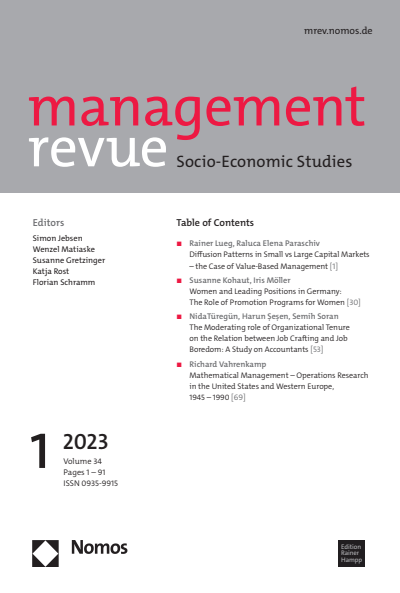Entitlement Disconnect: Exploring Management Graduates’ Mental Schema in Their Anticipatory Psychological Contract
IF 1.7
0 MANAGEMENT
引用次数: 0
Abstract
In this paper, we expanded on the psychological contract theory by exploring the mental schemas of graduates’ anticipatory psychological contract before they start employment. With this research, we aimed to explore and substantiate themes associated with the mental schemas of graduates, so that the psychological contract formation theory can be expanded by investigating the role of entitlement disconnect and its influence on the anticipatory psychological contract. Literature regarding the formulation of the psychological contract is still underdeveloped, especially regarding the anticipatory phase thereof. Entitlement disconnect has also not been focused on in past literature, especially as a component of the anticipatory psychological contract that can have an impact on graduates’ career schema and voluntary turnover intention. A qualitative approach to research was adopted consisting of interviews with 18 final-year economics and management sciences graduate students in the final phase of their degrees to derive themes associated with the mental schemas of graduates’ anticipatory psychological contract. The findings suggest that graduates already have a developed mental schema that was based on their entitlement. It was also confirmed that graduates had a disposition towards voluntary turnover intuition before organisational entry, which was due to an entitlement disconnect perception. The final and most surprising finding was that some graduates already displayed pre-employment violations, where graduates already anticipated psychological contract breach before entering an employment relationship. This research suggests that graduates’ mental schemas in their anticipatory psychological contract play a much bigger role in the development of their psychological contract, after organisational entry than what was initially thought.权利脱节:管理专业毕业生预期心理契约中的心理图式探索
本文在心理契约理论的基础上,对大学生就业前预期心理契约的心理图式进行了探讨。本研究旨在探索和证实与大学生心理图式相关的主题,通过研究权利脱节的作用及其对预期心理契约的影响,拓展大学生心理契约形成理论。关于心理契约的形成,尤其是心理契约的预期阶段的研究还不发达。在过去的文献中,权利脱节也没有得到关注,特别是作为预期心理契约的一个组成部分,它可以影响毕业生的职业图式和自愿离职意愿。采用定性研究方法,包括对18名处于学位最后阶段的经济学和管理学研究生进行访谈,以得出与毕业生预期心理契约心理图式相关的主题。研究结果表明,毕业生已经形成了一种基于他们的权利的心理图式。研究还证实,毕业生在进入组织之前有一种自愿离职的直觉倾向,这是由于一种权利脱节的感知。最后也是最令人惊讶的发现是,一些毕业生在就业前就已经表现出了违约行为,他们在进入雇佣关系之前就已经预料到心理上的违约行为。本研究表明,毕业生进入组织后,预期心理契约中的心理图式在心理契约发展中的作用比最初认为的要大得多。
本文章由计算机程序翻译,如有差异,请以英文原文为准。
求助全文
约1分钟内获得全文
求助全文
来源期刊

Management Revue
MANAGEMENT-
CiteScore
1.20
自引率
0.00%
发文量
7
期刊介绍:
Management Revue - Socio-Economic Studies is an interdisciplinary European journal that undergoes peer review. It publishes qualitative and quantitative work, along with purely theoretical papers, contributing to the study of management, organization, and industrial relations. The journal welcomes contributions from various disciplines, including business and public administration, organizational behavior, economics, sociology, and psychology. Regular features include reviews of books relevant to management and organization studies.
Special issues provide a unique perspective on specific research fields. Organized by selected guest editors, each special issue includes at least two overview articles from leaders in the field, along with at least three new empirical papers and up to ten book reviews related to the topic.
The journal aims to offer in-depth insights into selected research topics, presenting potentially controversial perspectives, new theoretical insights, valuable empirical analysis, and brief reviews of key publications. Its objective is to establish Management Revue - Socio-Economic Studies as a top-quality symposium journal for the international academic community.
 求助内容:
求助内容: 应助结果提醒方式:
应助结果提醒方式:


